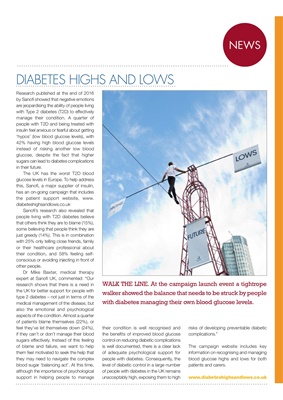
NEWS
DIABETES HIGHS AND LOWS
Research published at the end of 2016
by Sanofi showed that negative emotions
are jeopardising the ability of people living
with Type 2 diabetes (T2D) to effectively
manage their condition. A quarter of
people with T2D and being treated with
insulin feel anxious or fearful about getting
'hypos' (low blood glucose levels), with
42% having high blood glucose levels
instead of risking another low blood
glucose, despite the fact that higher
sugars can lead to diabetes complications
in their future.
The UK has the worst T2D blood
glucose levels in Europe. To help address
this, Sanofi, a major supplier of insulin,
has an on-going campaign that includes
the patient support website, www.
diabeteshighsandlows.co.uk
Sanofi's research also revealed that
people living with T2D diabetes believe
that others think they are to blame (15%),
some believing that people think they are
just greedy (14%). This is in combination
with 25% only telling close friends, family
or their healthcare professional about
their condition, and 58% feeling self-
conscious or avoiding injecting in front of
other people.
Dr Mike Baxter, medical therapy
expert at Sanofi UK, commented: "Our
research shows that there is a need in
the UK for better support for people with
type 2 diabetes - not just in terms of the
medical management of the disease, but
also the emotional and psychological
aspects of the condition. Almost a quarter
of patients blame themselves (22%), or
feel they've let themselves down (24%),
if they can't or don't manage their blood
sugars effectively. Instead of this feeling
of blame and failure, we want to help
them feel motivated to seek the help that
they may need to navigate the complex
blood sugar 'balancing act'. At this time,
although the importance of psychological
support in helping people to manage
their condition is well recognised and
the benefits of improved blood glucose
control on reducing diabetic complications
is well documented, there is a clear lack
of adequate psychological support for
people with diabetes. Consequently, the
level of diabetic control in a large number
of people with diabetes in the UK remains
unacceptably high, exposing them to high
risks of developing preventable diabetic
complications."
The campaign website includes key
information on recognising and managing
blood glucose highs and lows for both
patients and carers.
www.diabeteshighsandlows.co.uk
WALK THE LINE. At the campaign launch event a tightrope
walker showed the balance that needs to be struck by people
with diabetes managing their own blood glucose levels.